Featured Book
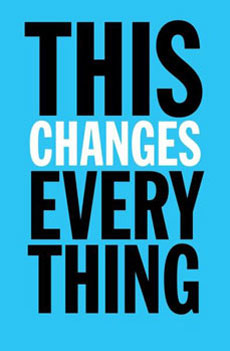 This Changes Everything by Naomi Klein is a brilliant overview of global warming and its economic and political ramifications. The award-winning journalist looks at a proposed Marshall Plan for the Earth and assesses what will be needed to spur citizens and politicians to take action on this complicated problem. She salutes the heroes and warriors of this movement, whom she calls "Blockadia," people on the local level who are spreading awareness, marching for changes, and making sacrifices for the common good.
This Changes Everything by Naomi Klein is a brilliant overview of global warming and its economic and political ramifications. The award-winning journalist looks at a proposed Marshall Plan for the Earth and assesses what will be needed to spur citizens and politicians to take action on this complicated problem. She salutes the heroes and warriors of this movement, whom she calls "Blockadia," people on the local level who are spreading awareness, marching for changes, and making sacrifices for the common good.
Recommended Books
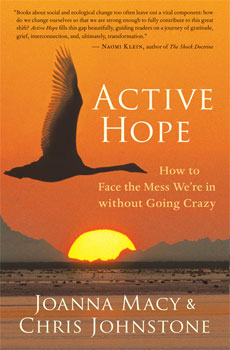 Active Hope: How to Face the Mess We're in without Going Crazy by Joanna Macy and Chris Johnstone presents practices and exercises to help us deal with the planetary emergency and the pain we feel for the natural world. Active hope also gives us with a wider sense of self and the desire to connect with like-minded souls.
Active Hope: How to Face the Mess We're in without Going Crazy by Joanna Macy and Chris Johnstone presents practices and exercises to help us deal with the planetary emergency and the pain we feel for the natural world. Active hope also gives us with a wider sense of self and the desire to connect with like-minded souls.
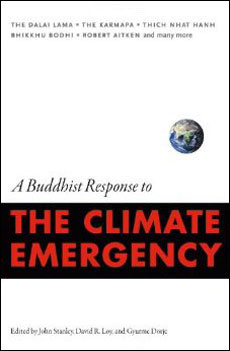 A Buddhist Response to the Climate Emergency by John Stanley, David R. Loy, and Gyurme Dorje states that we must awaken from the illusion of the separate self, the idea that humans can subjugate the Earth, and the short-term thinking that stops us from immediate action. The middle section of the book contains a handful of poignant aspirational prayers related to the climate emergency. Another section covers possible solutions.
A Buddhist Response to the Climate Emergency by John Stanley, David R. Loy, and Gyurme Dorje states that we must awaken from the illusion of the separate self, the idea that humans can subjugate the Earth, and the short-term thinking that stops us from immediate action. The middle section of the book contains a handful of poignant aspirational prayers related to the climate emergency. Another section covers possible solutions.
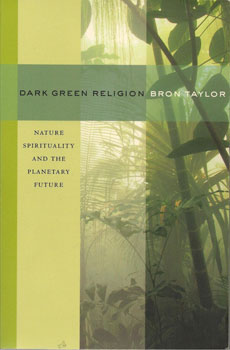 Dark Green Religion: Nature Spirituality and the Planetary Future by Bron Taylor makes a convincing case for dark green religion as sensuous, sensible, and sustainable. Pioneers marching under a banner of environmental ethics have a rich and deep vision of a sacred world where kinship and interdependence are honored and enacted.
Dark Green Religion: Nature Spirituality and the Planetary Future by Bron Taylor makes a convincing case for dark green religion as sensuous, sensible, and sustainable. Pioneers marching under a banner of environmental ethics have a rich and deep vision of a sacred world where kinship and interdependence are honored and enacted.
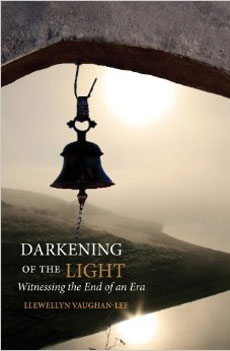 Darkening of the Light: Witnessing the End of an Era by Llewellyn Vaughan-Lee sees us now living in an era beyond the tipping point of environmental catastrophe brought on by climate change. The few shards of light that remain can help us find our way back to global oneness and Earth stewardship.
Darkening of the Light: Witnessing the End of an Era by Llewellyn Vaughan-Lee sees us now living in an era beyond the tipping point of environmental catastrophe brought on by climate change. The few shards of light that remain can help us find our way back to global oneness and Earth stewardship.
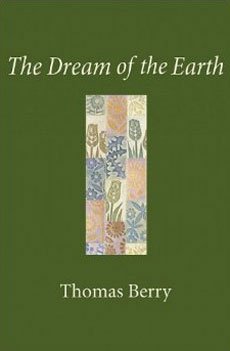 The Dream of the Earth by Thomas Berry is a classic eco-theological work first published in 1988; it presents a vision based on courtesy and empathy for the earth and all living things. He believes that the churches and universities have a major role to play in helping people see the Earth as a living organism and to link evolution and ethics.
The Dream of the Earth by Thomas Berry is a classic eco-theological work first published in 1988; it presents a vision based on courtesy and empathy for the earth and all living things. He believes that the churches and universities have a major role to play in helping people see the Earth as a living organism and to link evolution and ethics.
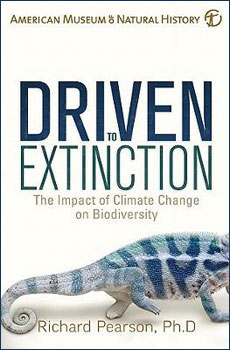 Driven to Extinction: The Impact of Climate Change on Biodiversity by Richard Pearson reveals the "fingerprints" of climate change on many of the 1.5 million species living on the planet. This book is an ideal resource for citizens concerned about how climate change threatens biodiversity.
Driven to Extinction: The Impact of Climate Change on Biodiversity by Richard Pearson reveals the "fingerprints" of climate change on many of the 1.5 million species living on the planet. This book is an ideal resource for citizens concerned about how climate change threatens biodiversity.
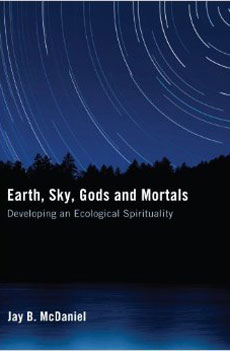 Earth, Sky, Gods and Mortals: Developing an Ecological Spirituality by Jay McDaniel calls for an ecological spirituality that is liberating, operates in the here-and-now, has a process understanding of God, holds an openness to all religions, and sees the universe as the body of God. The foundation for this path is a loving care ethic.
Earth, Sky, Gods and Mortals: Developing an Ecological Spirituality by Jay McDaniel calls for an ecological spirituality that is liberating, operates in the here-and-now, has a process understanding of God, holds an openness to all religions, and sees the universe as the body of God. The foundation for this path is a loving care ethic.
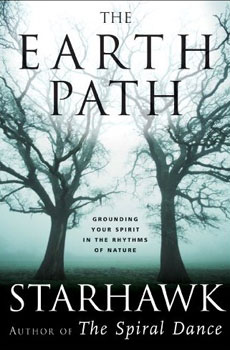 The Earth Path: Grounding Your Spirit in The Rhythms of Nature by Starhawk points out the value of adopting the kind of Earth-cherishing spirituality that has been developed over the ages by indigenous cultures. She describes her own spiritual practices designed to ground our spirits in the rhythms of nature.
The Earth Path: Grounding Your Spirit in The Rhythms of Nature by Starhawk points out the value of adopting the kind of Earth-cherishing spirituality that has been developed over the ages by indigenous cultures. She describes her own spiritual practices designed to ground our spirits in the rhythms of nature.
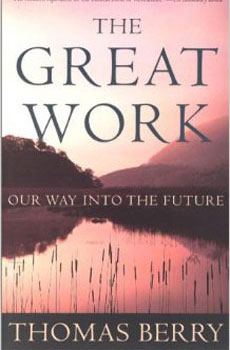 The Great Work: Our Way into the Future by Thomas Berry posits geography and ethics as essential tools for "rethinking our situation at the species level." The Great Work involves teaching people to reverence the divine milieu in which we live.
The Great Work: Our Way into the Future by Thomas Berry posits geography and ethics as essential tools for "rethinking our situation at the species level." The Great Work involves teaching people to reverence the divine milieu in which we live.
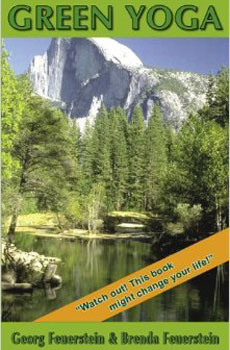 Green Yoga by Georg Feuerstein and Brenda Feuerstein contends that the practices of yoga have great relevance to the health and well-being of the planet. The Feuersteins end the book with practical things yoga practitioners can do to make a difference.
Green Yoga by Georg Feuerstein and Brenda Feuerstein contends that the practices of yoga have great relevance to the health and well-being of the planet. The Feuersteins end the book with practical things yoga practitioners can do to make a difference.
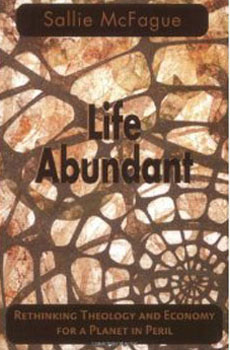 Life Abundant: Rethinking Theology and Economy for a Planet in Peril by Sallie McFague affirms three rules by which all members of the planetary household must abide: take only your share, clean up after yourself, and keep the place in good repair for future generations. Virtues of the abundant life include limitations on energy use, sacrifice for the sake of others, and living with enoughness.
Life Abundant: Rethinking Theology and Economy for a Planet in Peril by Sallie McFague affirms three rules by which all members of the planetary household must abide: take only your share, clean up after yourself, and keep the place in good repair for future generations. Virtues of the abundant life include limitations on energy use, sacrifice for the sake of others, and living with enoughness.
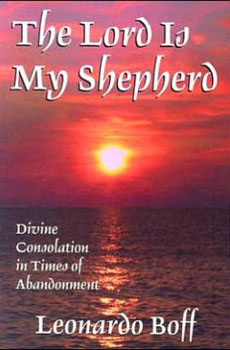 The Lord Is My Shepherd: Divine Consolation in Times of Abandonment by Leonardo Boff mines the many meanings of this famous psalm and opens our eyes to the responsibilities we face as the Earth's co-creators. Christians, in his eyes, are called to care as much for polluted streams and savaged rain forests as for their families.
The Lord Is My Shepherd: Divine Consolation in Times of Abandonment by Leonardo Boff mines the many meanings of this famous psalm and opens our eyes to the responsibilities we face as the Earth's co-creators. Christians, in his eyes, are called to care as much for polluted streams and savaged rain forests as for their families.
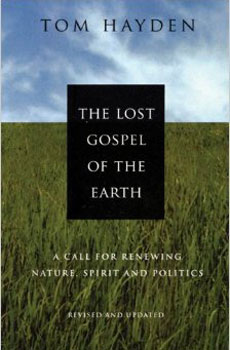 The Lost Gospel of Earth: A Call for Renewing Nature, Spirit, and Politics by Tom Hayden asserts that we need to recover the lost nature mysticism of Native American spirituality, Celtic spirituality, and Hasidic philosophy. A new politics of spirit and nature can be built upon attention, reverence, justice, and zeal.
The Lost Gospel of Earth: A Call for Renewing Nature, Spirit, and Politics by Tom Hayden asserts that we need to recover the lost nature mysticism of Native American spirituality, Celtic spirituality, and Hasidic philosophy. A new politics of spirit and nature can be built upon attention, reverence, justice, and zeal.
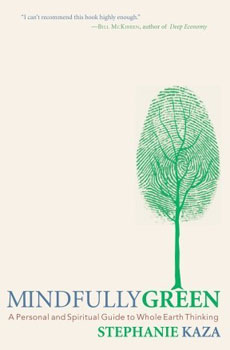 Mindfully Green: A Personal and Spiritual Guide to Whole Earth Thinking by Stephanie Kaza probes the Buddhist ideals of reducing harm, being with and witnessing the suffering of the ecosystem and all its parts, and embracing a deep systems view. The author delineates what she calls a lifeway practice of green living based on clear intention, community engagement, and shared wisdom.
Mindfully Green: A Personal and Spiritual Guide to Whole Earth Thinking by Stephanie Kaza probes the Buddhist ideals of reducing harm, being with and witnessing the suffering of the ecosystem and all its parts, and embracing a deep systems view. The author delineates what she calls a lifeway practice of green living based on clear intention, community engagement, and shared wisdom.
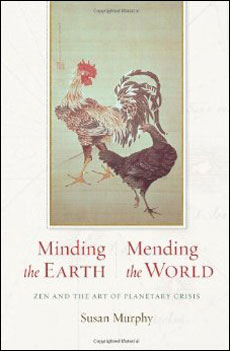 Minding the Earth, Mending the World: Zen and the Art of Planetary Crisis by Susan Murphy is the kind of approach we would expect from an inventive Zen teacher who wants to shift "consciousness back into the direction of wholeness." She gives us a medicine kit consisting of koans, stories, and practices designed to enable us to see the big picture, which is usually lacking in the thoughts of those who deny climate change.
Minding the Earth, Mending the World: Zen and the Art of Planetary Crisis by Susan Murphy is the kind of approach we would expect from an inventive Zen teacher who wants to shift "consciousness back into the direction of wholeness." She gives us a medicine kit consisting of koans, stories, and practices designed to enable us to see the big picture, which is usually lacking in the thoughts of those who deny climate change.
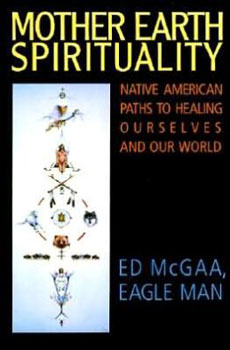 Mother Earth Spirituality: Native American Paths to Healing Ourselves and the World by Ed McGaa revolves around the four commandments from the Great Spirit which all stem from the character quality of respect. McGaa explains seven Earth Mother ceremonies which are meant to provide a healing balm in a stressed-out world.
Mother Earth Spirituality: Native American Paths to Healing Ourselves and the World by Ed McGaa revolves around the four commandments from the Great Spirit which all stem from the character quality of respect. McGaa explains seven Earth Mother ceremonies which are meant to provide a healing balm in a stressed-out world.
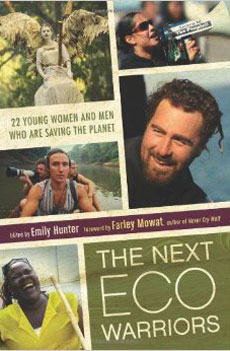 The Next Eco-Warriors: 22 Young Women and Men Who Are Saving the Planet by Emily Hunter makes it clear that there are large and powerful forces destroying the planet and all its resources in the name of progress and financial success. But as this enlightening and inspiring book points out, there is also a committed and diverse community of young people dedicated to saving the planet who are dealing with the daunting problems of energy use, overconsumption, the disappearance of the rainforests, the pollution of air and water, and other challenges.
The Next Eco-Warriors: 22 Young Women and Men Who Are Saving the Planet by Emily Hunter makes it clear that there are large and powerful forces destroying the planet and all its resources in the name of progress and financial success. But as this enlightening and inspiring book points out, there is also a committed and diverse community of young people dedicated to saving the planet who are dealing with the daunting problems of energy use, overconsumption, the disappearance of the rainforests, the pollution of air and water, and other challenges.
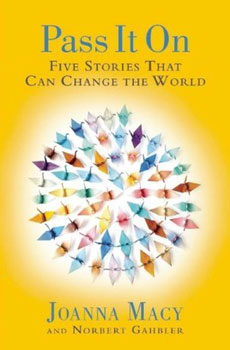 Pass It On: Five Stories That Can Change the World by Joanna Macy and Norbert Gahbler contains five accounts of people in Canada, India, Russia, Australia, and Tibet who have brought about changes to mend the broken world. These stories are designed to give hope to spiritual activists all over the globe.
Pass It On: Five Stories That Can Change the World by Joanna Macy and Norbert Gahbler contains five accounts of people in Canada, India, Russia, Australia, and Tibet who have brought about changes to mend the broken world. These stories are designed to give hope to spiritual activists all over the globe.
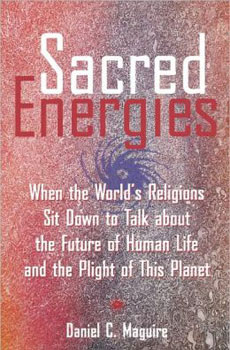 Sacred Energies: When the World's Religions Sit Down to Talk about the Future of Human Life and the Plight of This Planet by Daniel C. Maguire charts the negative fallouts from the developed world's reckless treatment of the environment. We can take heed and begin working to practice the simplicity of living advocated by Buddhists, the nonviolence of Hinduism, the emphasis upon harmony and balance in Taoism and Confucianism, the reverence for life of Islam, the hope for humanity in Judaism, and the quest for justice in Protestant and Catholic Christianity.
Sacred Energies: When the World's Religions Sit Down to Talk about the Future of Human Life and the Plight of This Planet by Daniel C. Maguire charts the negative fallouts from the developed world's reckless treatment of the environment. We can take heed and begin working to practice the simplicity of living advocated by Buddhists, the nonviolence of Hinduism, the emphasis upon harmony and balance in Taoism and Confucianism, the reverence for life of Islam, the hope for humanity in Judaism, and the quest for justice in Protestant and Catholic Christianity.
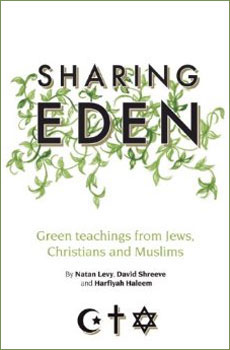 Sharing Eden: Green Teachings from Jews, Christians, and Muslims by Nathan Levy, David Shreeve, and Harfiyah Haleem features an interfaith exploration of six major green issues. The paperback ends with a glossary and a list of useful contacts.
Sharing Eden: Green Teachings from Jews, Christians, and Muslims by Nathan Levy, David Shreeve, and Harfiyah Haleem features an interfaith exploration of six major green issues. The paperback ends with a glossary and a list of useful contacts.
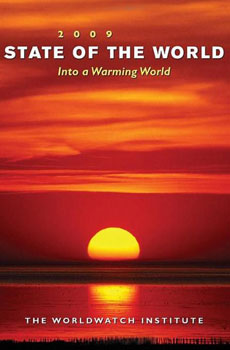 State of the World 2009: Into a Warming World by the Worldwatch Institute is a resource devoted to cope with many have called "the defining challenge of our age." This valuable resource concludes with a "Climate Change Reference Guide" and a "Glossary of 38 Key Terms for Understanding Climate Change."
State of the World 2009: Into a Warming World by the Worldwatch Institute is a resource devoted to cope with many have called "the defining challenge of our age." This valuable resource concludes with a "Climate Change Reference Guide" and a "Glossary of 38 Key Terms for Understanding Climate Change."
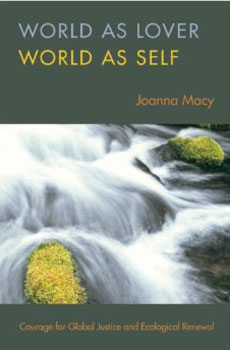 World As Lover, World As Self: Courage for Global Justice and Ecological Renewal by Joanna Macy is a rich resource for those who committed to global justice and ecological renewal. It concludes with the author's thoughts on what she calls "The Great Turning," the greening of the self, perseverance for the long haul, and the challenge of reclaiming the Earth for future generations.
World As Lover, World As Self: Courage for Global Justice and Ecological Renewal by Joanna Macy is a rich resource for those who committed to global justice and ecological renewal. It concludes with the author's thoughts on what she calls "The Great Turning," the greening of the self, perseverance for the long haul, and the challenge of reclaiming the Earth for future generations.
Essays about Nature
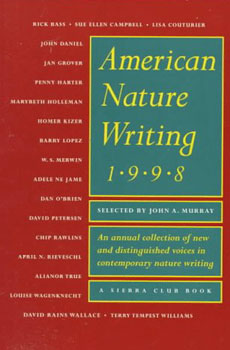 American Nature Writing 1998 by John A. Murray is a wonderful collection of essays. Nature writers tutor us in wonder and keep alive the tradition of being alert to the enchantments and mysteries of the natural world.
American Nature Writing 1998 by John A. Murray is a wonderful collection of essays. Nature writers tutor us in wonder and keep alive the tradition of being alert to the enchantments and mysteries of the natural world.
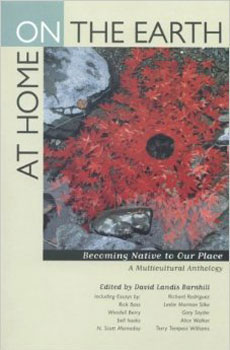 At Home on the Earth: Becoming Native to Our Place — A Multicultural Anthology by David Landis Barnhill delivers a soulful batch of essays by some of America's best nature essayists. Many of these men and women rejoice in what Huston Smith has called "an embeddedness in place."
At Home on the Earth: Becoming Native to Our Place — A Multicultural Anthology by David Landis Barnhill delivers a soulful batch of essays by some of America's best nature essayists. Many of these men and women rejoice in what Huston Smith has called "an embeddedness in place."
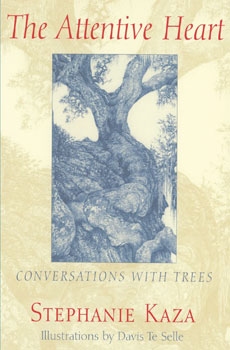 The Attentive Heart: Conversations With Trees by Stephanie Kaza brings together 27 of the author's poetic and persuasive essays about her conversations with trees. You will never look at a tree in quite the same way after reading this meditative masterpiece.
The Attentive Heart: Conversations With Trees by Stephanie Kaza brings together 27 of the author's poetic and persuasive essays about her conversations with trees. You will never look at a tree in quite the same way after reading this meditative masterpiece.
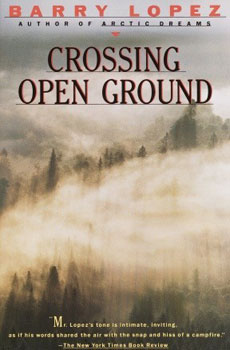 Crossing Open Ground by Barry Lopez is a collection of 14 essays in which this National Book Award winner takes us to unusual wilderness places and shares some of the peculiar pleasures of close encounters with nature. This extraordinary book makes a good case for an ecological vision that recognizes that all living plants and creatures are to be savored and treasured.
Crossing Open Ground by Barry Lopez is a collection of 14 essays in which this National Book Award winner takes us to unusual wilderness places and shares some of the peculiar pleasures of close encounters with nature. This extraordinary book makes a good case for an ecological vision that recognizes that all living plants and creatures are to be savored and treasured.
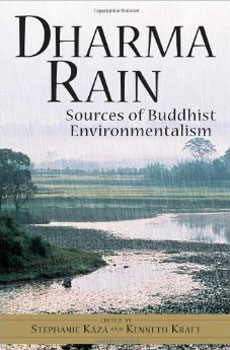 Dharma Rain: Sources of Buddhist Environmentalism by Stephanie Kaza and Kenneth Kraft delivers an in-depth, wide-ranging, and thought-provoking collection of essays, philosophical commentaries, religious texts, and spiritual practices. This well-done anthology reinforces the delineation of Buddhism as the most "green" of all the world's religions.
Dharma Rain: Sources of Buddhist Environmentalism by Stephanie Kaza and Kenneth Kraft delivers an in-depth, wide-ranging, and thought-provoking collection of essays, philosophical commentaries, religious texts, and spiritual practices. This well-done anthology reinforces the delineation of Buddhism as the most "green" of all the world's religions.
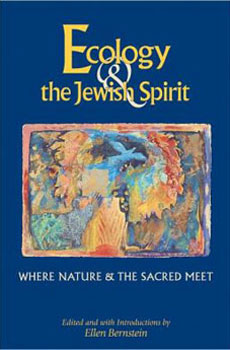 Ecology and the Jewish Spirit: Where Nature and the Sacred Meet by Ellen Bernstein is organized around the principle that the idea of God as creator and of nature as a manifestation of God can inspire individuals to live environmentally aware and balanced lives. A variety of authors discuss the ecological values of the biblical creation story, traditional law, holiday cycles, prayer, and good deeds.
Ecology and the Jewish Spirit: Where Nature and the Sacred Meet by Ellen Bernstein is organized around the principle that the idea of God as creator and of nature as a manifestation of God can inspire individuals to live environmentally aware and balanced lives. A variety of authors discuss the ecological values of the biblical creation story, traditional law, holiday cycles, prayer, and good deeds.
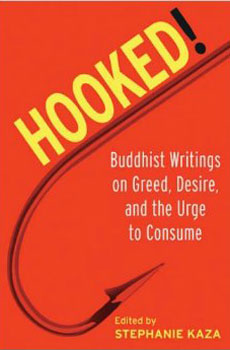 Hooked! Buddhist Writings on Greed, Desire, and the Urge to Consume by Stephanie Kaza is an anthology of 17 essays. She is convinced that Buddhism offers "some handhold, some time-tested teachings to temper the raging appetites around the globe."
Hooked! Buddhist Writings on Greed, Desire, and the Urge to Consume by Stephanie Kaza is an anthology of 17 essays. She is convinced that Buddhism offers "some handhold, some time-tested teachings to temper the raging appetites around the globe."
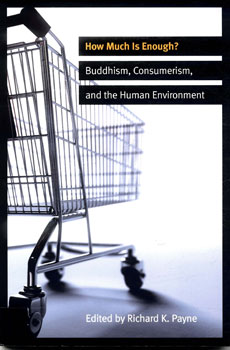 How Much Is Enough? Buddhism, Consumerism, and the Human Environment by Richard K. Payne is a collection of essays which show the relevance of the concepts of impermanence, craving, and interdependence to ethical questions about overconsumption and the lessening of desires.
How Much Is Enough? Buddhism, Consumerism, and the Human Environment by Richard K. Payne is a collection of essays which show the relevance of the concepts of impermanence, craving, and interdependence to ethical questions about overconsumption and the lessening of desires.
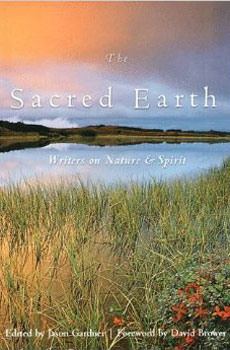 The Sacred Earth: Writings on Nature & Spirit by Jason Gardner is comprised of essays by a variety of nature writers, biologists, and academics on the glories, mysteries, and wonders of the natural world. This is a top-of-the-line resource.
The Sacred Earth: Writings on Nature & Spirit by Jason Gardner is comprised of essays by a variety of nature writers, biologists, and academics on the glories, mysteries, and wonders of the natural world. This is a top-of-the-line resource.
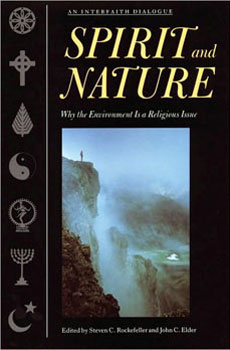 Spirit and Nature: Why the Environment Is a Religious Issue — An Interfaith Dialogue by Steven Rockefeller and John Elder gives voice to the fears of those troubled by the destruction of the natural world. These voices must be heard as the nations of the world set out to construct a global environmental ethic.
Spirit and Nature: Why the Environment Is a Religious Issue — An Interfaith Dialogue by Steven Rockefeller and John Elder gives voice to the fears of those troubled by the destruction of the natural world. These voices must be heard as the nations of the world set out to construct a global environmental ethic.
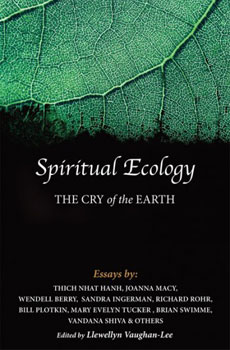 Spiritual Ecology: The Cry of the Earth by Llewellyn Vaughan-Lee is an inspiring collection of essays by spiritual teachers and writers marching under the banner of spiritual activism for the Earth. They preach that it is time for people to step up and turn things around.
Spiritual Ecology: The Cry of the Earth by Llewellyn Vaughan-Lee is an inspiring collection of essays by spiritual teachers and writers marching under the banner of spiritual activism for the Earth. They preach that it is time for people to step up and turn things around.
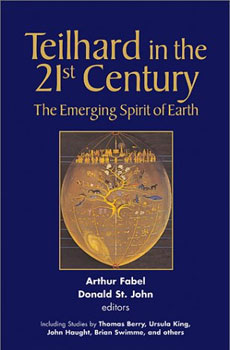 Teilhard in the 21st Century: The Emerging Spirit of Earth by Arthur Fabel and Donald St. John points out the contributions of this Jesuit seer whose spiritual quest was to meld the old religious story with the new scientific one. Other sections of the book deal with ecology and the theological and social dimensions of Teilhard's work.
Teilhard in the 21st Century: The Emerging Spirit of Earth by Arthur Fabel and Donald St. John points out the contributions of this Jesuit seer whose spiritual quest was to meld the old religious story with the new scientific one. Other sections of the book deal with ecology and the theological and social dimensions of Teilhard's work.
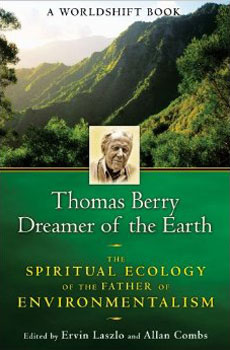 Thomas Berry, Dreamer of the Earth: The Spiritual Ecology of the Father of Environmentalism by Ervin Laszlo and Allan Combs contains ten essays centered on the life and work of Thomas Berry (1914-2009). Here is another book counseling us to find all the meaning we need in an Earth-based spirituality.
Thomas Berry, Dreamer of the Earth: The Spiritual Ecology of the Father of Environmentalism by Ervin Laszlo and Allan Combs contains ten essays centered on the life and work of Thomas Berry (1914-2009). Here is another book counseling us to find all the meaning we need in an Earth-based spirituality.
Sermons about Nature
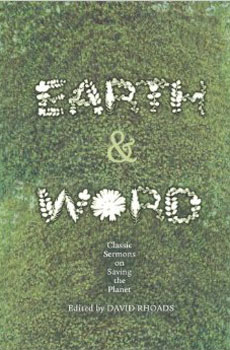 Earth & Word: Classic Sermons on Saving the Planet by David Rhoads brings together sermons from a wide variety of denominations that can be used in different contexts.The three which stood out for us were by Sallie McFague on the dire effects of consumerism on the planet, Bill McGibben on God and the environmental crisis, and Joseph Sittler on care of the Earth.
Earth & Word: Classic Sermons on Saving the Planet by David Rhoads brings together sermons from a wide variety of denominations that can be used in different contexts.The three which stood out for us were by Sallie McFague on the dire effects of consumerism on the planet, Bill McGibben on God and the environmental crisis, and Joseph Sittler on care of the Earth.
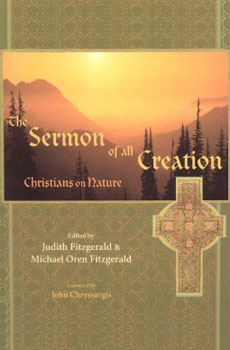 The Sermon of All Creation: Christians on Nature by Judith Fitzgerald and Michael Oren Fitzgerald offers quotations from Christian saints, writers, and thinkers on the wonders and glories of the natural world.
The Sermon of All Creation: Christians on Nature by Judith Fitzgerald and Michael Oren Fitzgerald offers quotations from Christian saints, writers, and thinkers on the wonders and glories of the natural world.
Other Recommended Books
- A Conservationist Manifesto by Scott Russell Sanders
- The Cosmic Dance: An Invitation to Experience Our Oneness by Joyce Rupp
- Eco-Spirituality: Toward a Reverent Life by Charles Cummings
- 50 Ways to Save the Ocean by David Helvarg
- The Findhorn Book of Connecting with Nature by John R. Stowe
- The Future of Ice: A Journey into Cold by Gretel Ehrlich
- The Green Bible: Understand the Bible's Powerful Message for the Earth
- The Green Collar Economy: How One Solution Can Fix Our Two Biggest Problems by Van Jones
- Grounded in Love: Ecology, Faith and Action by Nancy Roth
- Harm Not the Earth by Megan McKenna
- I Want to Be Left Behind: Finding Rapture Here on Earth by Brenda Peterson
- Making the Good Life Last: Four Keys to Sustainable Living by Michael A. Schuler
- Nature and the Human Soul: Cultivating Wholeness and Community in a Fragmented World by Bill Plotkin
- Nature's Kindred Spirits: Aldo Leopold, Joseph Wood Krutch, Edward Abbey, Annie Dillard, and Gary Snyder by James I. McClintock
- Nuclear War and Environmental Catastrophe by Noam Chomsky and Laray Polk
- Wild Communion: Experiencing Peace in Nature by Ruth Baetz
- Wisdom of the Elders: Sacred Native Stories of Nature by David Suzuki and Peter Knudtson
- The World We Have: A Buddhist Approach to Peace and Ecology by Thich Nhat Hahn
More Books on Climate Change
